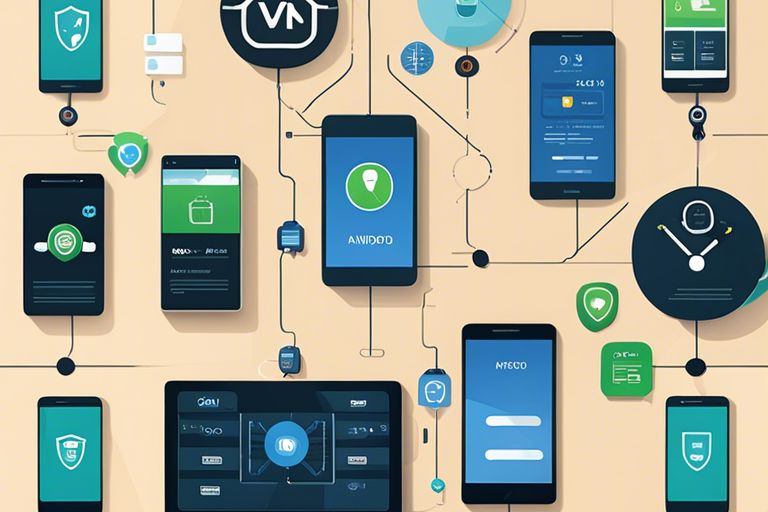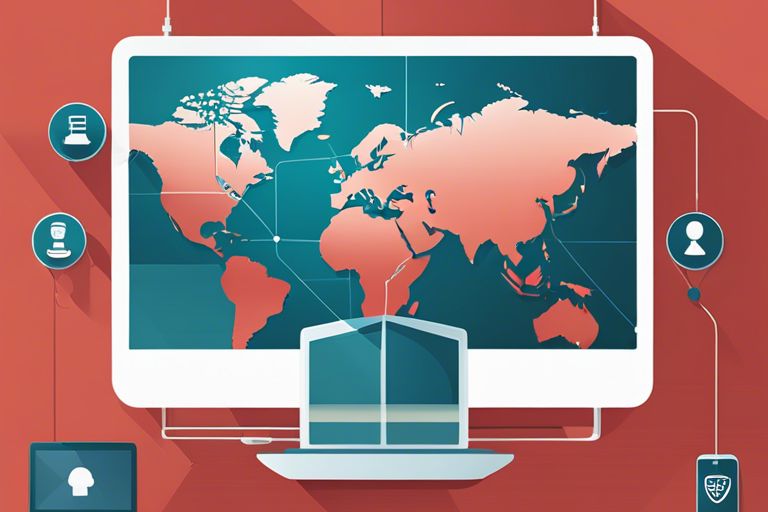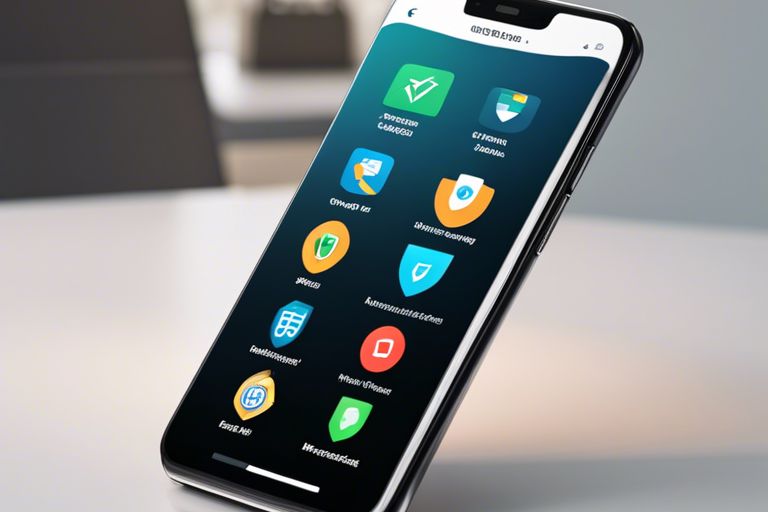How to Set Up a VPN on All Android Phones & Devices in 2024
Security is paramount in today’s digital world, and using a VPN on your Android phone or tablet is an excellent way to protect your online activity and sensitive data. This guide will provide you with step-by-step instructions on setting up a VPN, ensuring you can browse the internet anonymously and access global streaming services securely. Whether you opt for a dedicated VPN app or a manual setup, you’ll enhance your online privacy and enjoy safer, unrestricted web access.
Key Takeaways:
- Choose a dedicated VPN app: Opt for a standalone app like ExpressVPN for better security and performance compared to built-in VPN services on Android devices.
- Easy installation: Download the VPN app from the Play Store, log in, and connect to your preferred server in just a few steps.
- Alternative installation methods: Use APK files for uncertified devices or configure OpenVPN if your provider lacks a dedicated app.
- Router setup option: Configure a VPN directly on your router to protect all connected devices, including those that don’t natively support VPNs.
- Manual VPN configuration: For advanced users, you can manually set up a VPN on your Android device through the network settings using compatible protocols like L2TP/IPSec.
Understanding VPNs and Their Importance for Android Devices
The use of a VPN (Virtual Private Network) has become imperative for safeguarding your data and privacy in today’s digital landscape, especially on Android devices, which are often targets for cyber threats. A VPN encrypts your internet connection, ensuring that your online activities remain private and secure from prying eyes.
What is a VPN?
Any Virtual Private Network (VPN) is a technology that creates a secure connection between your device and the internet. It masks your IP address and encrypts your data, allowing you to browse the web anonymously and access restricted content.
How VPNs Work
With a VPN, your internet traffic is routed through a secure server, which can be located in a different country. This not only changes your IP address but also encrypts your data, making it difficult for others to intercept or steal your information. When you connect to a VPN server, your device communicates with it securely over a tunnel, shielding your online activities.
This secure connection prevents ISPs, hackers, and even government authorities from tracking your internet usage. Additionally, VPNs can help you bypass geographical restrictions on streaming services, allowing you to access content that may be blocked in your location.
Benefits of Using a VPN on Android
Android devices are especially vulnerable to security threats due to their widespread use. By using a VPN, you can protect your personal information from hackers, especially when connected to public Wi-Fi networks.
Understanding the benefits of using a VPN on your Android device is crucial: you can enhance your online privacy by keeping your data encrypted, avoid geographic restrictions that prevent access to streaming services, and secure your sensitive information when using public networks. Given that Android devices can be easy targets for cyber threats, ensuring your data is protected with a reliable VPN is more important than ever in 2024.
Quick Guide: How to Set Up a VPN on Android in 3 Easy Steps
Some users might find setting up a VPN on their Android devices challenging, but it can be accomplished quickly with the right guidance. Follow these three simple steps to enhance your online security and access content safely.
Step 1: Choosing the Right VPN Service
Any good VPN service should prioritize security, speed, and user-friendliness. Look for a provider like ExpressVPN, which offers fast connections and military-grade encryption. It’s necessary to select a VPN that allows access to your favorite streaming services and has a proven track record for protecting your data.
Step 2: Installing the VPN App
Easy installation is one of the key benefits of using a dedicated VPN app. Download the VPN app directly from the Google Play Store or, if necessary, obtain the APK file from your VPN provider’s website.
A user-friendly interface like that of ExpressVPN will simplify the setup process. Once the app is downloaded, log in using your subscription credentials. This step is crucial, as a reliable app can seamlessly integrate with your device, ensuring stable and secure connections.
Step 3: Connecting to a VPN Server
Installing your VPN app is just the beginning; connecting to a server is where the real magic happens. This step allows you to browse the internet with enhanced privacy.
Service selection is vital when connecting to a VPN server. After logging in, choose a server location that suits your needs—whether for bypassing geo-restrictions or ensuring faster speeds. Providers like ExpressVPN offer over 3,000 servers globally, allowing you to connect to a server quickly and safely, ensuring that your online activities remain anonymous and secure.

Detailed Step-by-Step Guide to Set Up a VPN on Android Devices
After understanding the importance of using a VPN for your online privacy and security, setting one up on your Android device is straightforward. Below is a detailed breakdown of various methods to configure a VPN.
| Method | Steps |
|---|---|
| Using a Dedicated VPN App | 1. Download the app from the Play Store. 2. Log in with your credentials. 3. Connect to a server and start browsing. |
| Configuring VPN Settings Manually | 1. Navigate to Settings. 2. Add a new VPN profile. 3. Enter your VPN details and save. |
| Adding an OpenVPN Profile | 1. Download configuration files. 2. Use an OpenVPN app. 3. Import the configuration file to connect. |
Using a Dedicated VPN App
With a dedicated VPN app, you can easily set up and manage your VPN connection. Simply download the app, such as ExpressVPN, from the Google Play Store, log in to your account, and choose a server. This method provides you with robust security features, including military-grade encryption and a no-logs policy, ensuring your online activities remain private.
Configuring VPN Settings Manually
Configuring the VPN settings manually allows you to connect without a dedicated app. This can be beneficial if you’re using a lightweight device or if your VPN provider doesn’t offer an app. Simply go to your device’s settings, access ‘VPN’, and enter the required details such as the VPN type, server address, username, and password.
Devices may vary in how they display settings, but the general process is similar across most Android models. Always ensure that you use secure protocols; Avoid PPTP as it poses security risks, and opt for safer options like L2TP/IPSec for better protection while browsing.
Adding an OpenVPN Profile
Any user can enhance their security by adding an OpenVPN profile. First, you’ll need to download the necessary configuration files from your VPN provider. After that, you can use an OpenVPN app to import these files and set up your connection.
OpenVPN profiles provide you with a versatile way to connect to various servers offered by your VPN. This method not only enhances the flexibility of your connection but also maintains a high level of security. By using OpenVPN’s robust encryption, your sensitive data is well-protected against potential threats, making it a trustworthy option for serious users.
Advanced VPN Setup Options for Android
Many users want to maximize their online security and privacy on Android devices by exploring advanced VPN setup options. Here are several effective methods to enhance your VPN experience:
- Setting Up a VPN Through a Router
- Using APK Files for VPN Installation
- Understanding and Modifying Android VPN Settings
Advanced VPN Setup Methods
| Method | Description |
|---|---|
| Router Setup | Protect all connected devices by installing a VPN directly on your router. |
| APK Installation | Install the VPN app using APK files for devices that do not have access to the Play Store. |
| Modifying VPN Settings | Adjust protocol settings on your Android device for enhanced security. |
Setting Up a VPN Through a Router
Setup a VPN directly on your router to protect all devices connected to its network. This method is especially useful for devices that do not natively support VPNs, such as smart TVs and gaming consoles. By doing so, you ensure that every device in your home benefits from the VPN’s security features without needing individual configurations.
Using APK Files for VPN Installation
Setting up your VPN can also involve using APK files, particularly if you have an Android device that can’t access the Play Store. By downloading the APK file directly from your VPN provider’s website, you can install the app manually, providing you access to secure browsing.
Files should always be downloaded from the official website of your VPN provider to avoid any security risks. Once downloaded, you will need to enable installations from unknown sources in your device settings to proceed with the manual installation. This approach gives you greater flexibility if you encounter restrictions or limitations with the Play Store.
Understanding and Modifying Android VPN Settings
Settings on your Android device can be modified to enhance your VPN’s performance and security. By manually adjusting protocols and connection settings, you can optimize your VPN for specific tasks, such as streaming or gaming.
Options you choose can significantly affect your online experience. For instance, switching from less secure protocols like PPTP to more robust options like L2TP/IPSec can enhance your data’s protection. However, always be cautious with protocol settings, as improper configurations could expose you to vulnerabilities. Prioritize protocols that offer strong encryption and avoid those that might compromise your online privacy.
Best VPNs for Android Devices in 2024
Once again, securing your online activity on Android devices is crucial in 2024, especially with increasing cyber threats. Choosing the right VPN can significantly enhance your security and privacy while providing access to global streaming services. Here are the critical factors to consider when selecting the best VPN for your Android device.
Criteria for Choosing the Best VPN
Best VPNs for Android should feature a user-friendly interface, advanced security protocols like OpenVPN, and a wide range of worldwide servers. Additionally, consider their connection speeds, customer support, and refund policies to ensure your investment is protected.
Top VPN Recommendations
On your journey to finding the best VPN, ExpressVPN stands out as a top choice with its excellent speed and security features. It provides access to over 3,000 servers in 105 countries, making it perfect for streaming content from platforms like Netflix and Amazon Prime Video.
Criteria such as speed and server availability are necessary when choosing a VPN for your Android devices. With ExpressVPN, you enjoy an average speed of around 94 Mbps, which means you can stream in 8K UHD without buffering. Coupled with military-grade encryption and a no-logs policy, it ensures your online activity remains private and protected.
Comparing Features and Pricing
On top of the basic functionalities, understanding the pricing and features of various VPNs can help you make an informed choice. Here’s a comparative table of prominent VPNs for Android:
VPN Features and Pricing
| VPN | Features |
|---|---|
| ExpressVPN | Blazing-fast speeds, military-grade encryption, no-logs policy, 30-day money-back guarantee |
| NordVPN | Over 5,200 servers, robust security features, double VPN technology |
| Surfshark | Unlimited device connections, competitive pricing, and strong encryption |
A deeper analysis of pricing and included features can help tailor your decision based on your specific needs. Make sure you choose a VPN that aligns not only with your budget but also with the functionalities you deem necessary to protect your online identity.
Specialized VPN Use Cases on Android
Not all VPNs serve the same purpose, and tailored solutions can enhance your online experience. Here are some specialized use cases for using a VPN on your Android device.
Using VPNs for Streaming Services
The use of a VPN can significantly improve your streaming experience. By connecting to a server in a different country, you can access a wider array of content available on platforms like Netflix, Disney+, and Amazon Prime Video. This allows you to stream popular shows and movies that may not be available in your region.
Bypassing Geo-Restrictions
Using a VPN is an effective way to bypass geo-restrictions imposed by various online services. By connecting to a VPN server in a region where the content is accessible, you can unlock services like Hulu, BBC iPlayer, and many others that restrict access based on your geographical location.
Services often enforce geo-restrictions to comply with licensing agreements, but you can circumvent these limitations with a VPN. Your real IP address is masked, and you can appear as though you’re browsing from a permitted region. This not only grants you access to a wealth of content but also enables you to enjoy your subscriptions while traveling.
Enhancing Online Privacy and Security
Online safety can be increased significantly by using a VPN. By routing your internet traffic through a secure server, you can prevent hackers and other malicious entities from accessing your personal information.
Cases of data breaches and identity theft are on the rise, making it imperative to protect your online information. A VPN encrypts your data with military-grade encryption, ensuring that your online activities remain confidential. Furthermore, a no-logs policy helps maintain your privacy by preventing the storage of your browsing history, making it much harder for anyone to track your online behavior.
Common Issues When Setting Up a VPN on Android
Many users encounter issues when setting up a VPN on their Android devices. Recognizing these problems can help you troubleshoot effectively and ensure a seamless experience while maintaining your privacy and security online.
Troubleshooting Connection Problems
Troubleshooting connection problems involves a few basic steps, such as checking your internet connectivity, confirming the server status, and ensuring that your VPN app is updated. If you experience frequent disconnections, try switching to a different server or checking for any firewall settings that may be blocking the VPN connection.
Handling Compatibility Issues
Issues with compatibility often arise when your device is running an outdated version of Android or if the VPN app is not optimized for your specific device model. Always ensure that your Android version meets the minimum requirements of the VPN app.
Plus, many popular VPNs, like ExpressVPN, offer compatibility with a wide range of Android devices, but older models might face issues. Run a quick check for software updates on your Android device to improve compatibility, as manufacturers regularly release updates that enhance performance and security.
Addressing Speed and Performance Concerns
The speed of your VPN connection can be affected by several factors, including the server you choose, your internet speed, and the distance to the server location. If you notice a significant drop in speed while using your VPN, consider trying a different server or adjusting your VPN protocol in the app settings.
Handling speed and performance concerns is vital for an optimal experience. Some users experience slow speeds when connecting to servers located far from their geographical location due to increased latency. To enhance your experience, select a server that is close to your physical location and check your internet connection regularly to ensure it meets the required threshold for streaming or gaming activities without interruptions.
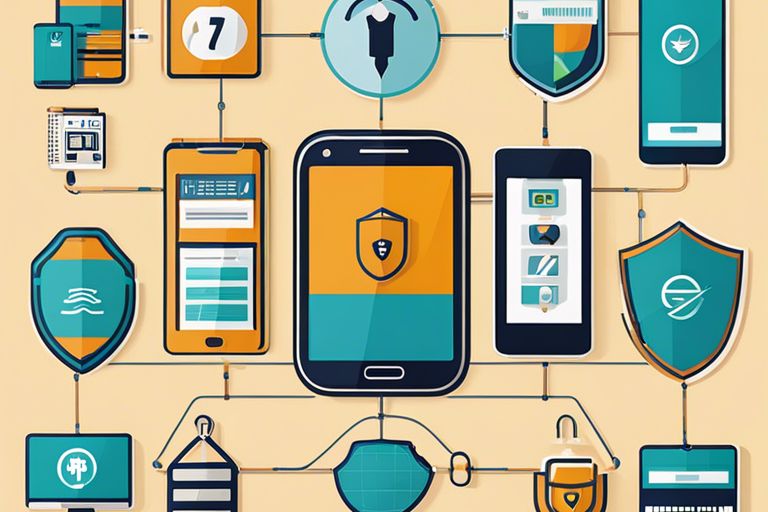
Security Features to Look for in an Android VPN
Despite the convenience of using a VPN on your Android device, it’s crucial to prioritize security features that protect your online activities. When opting for a VPN, consider important elements like encryption protocols, no-logs policies, and additional features like split tunneling and kill switches to ensure your data remains safe from prying eyes.
Encryption Protocols
Protocols are the backbone of your VPN’s security. Look for reputable VPNs that offer strong encryption methods, such as AES 256-bit encryption, which is widely recognized as the industry standard and is utilized by government agencies for its robust protection. Advanced protocols like OpenVPN are also important, as they provide both security and high-speed performance, making your browsing experience smooth and secure.
No-Logs Policy
Android users should give significant weight to a VPN’s no-logs policy. The best VPNs proudly announce that they do not track or store your online activity, ensuring your privacy remains intact. A strong no-logs policy means your data is not recorded, making it virtually impossible for third parties to monitor your browsing habits.
The worth of a no-logs policy cannot be overstated. This feature guarantees that your VPN provider does not keep any information about your internet usage, making it difficult for hackers or government entities to gather data about your online activities. Moreover, a reputable provider, such as ExpressVPN, undergoes regular audits to confirm their commitment to privacy, providing you with peace of mind while using your device.
Split Tunneling and Kill Switch Features
The inclusion of split tunneling and kill switch features in your VPN is critical for maximizing security. Split tunneling allows you to choose which apps use the VPN connection while letting others access the internet directly, ensuring versatility in your browsing experience. A kill switch, on the other hand, automatically halts your internet connection if the VPN drops, safeguarding your sensitive data from exposure.
Another important aspect of these features is how they enhance your online security while providing you more control over your internet traffic. With split tunneling, you can efficiently manage bandwidth by only routing important apps through the VPN, while the kill switch acts as your last line of defense, preventing any unauthorized access to your data during unexpected disconnections. Together, they ensure your online experience remains private and secure, even in unforeseen circumstances.
How to Optimize Your VPN Experience on Android
After setting up your VPN on your Android device, optimizing its performance will ensure a seamless and secure browsing experience. By selecting the right server, adjusting specific settings, and monitoring your connection speed, you can significantly enhance your online activities.
Selecting the Best Server Location
To optimize your VPN experience, choose a server location that is geographically closer to you. This often results in better connection speeds and lower latency. If you’re accessing specific content, select a server in the same country where that content is available, as this can help bypass geographic restrictions effectively.
Adjusting VPN Settings for Performance
For the best performance, consider adjusting your VPN settings. Certain protocols, such as OpenVPN or ExpressVPN’s proprietary Lightway, may provide faster connections. By toggling settings like “split tunneling,” you can designate which apps use the VPN, allowing other apps to access the internet directly for faster speeds.
Optimize your VPN settings by exploring options like enabling or disabling the kill switch, adjusting encryption levels, and experimenting with different protocols. These tweaks can help tailor your connection for speed, ensuring that your online activities, whether streaming or gaming, remain uninterrupted. Remember that a balance between speed and security is crucial, especially when sensitive data is involved.
Monitoring Your Internet Speed
Performance is key, so continuously monitor your internet speed while connected to the VPN to ensure optimal performance. Use speed testing tools to check your download and upload speeds regularly. This can help you identify when your VPN connections might be slowing down.
Another effective way to maintain high performance is to periodically disconnect and reconnect to your VPN server. This simple action can help you achieve higher speeds, especially if you’re experiencing lag or slow connections. If you notice persistent issues, consider switching servers or contacting your VPN’s support for assistance. Staying informed about your connection status will enhance your overall VPN experience, keeping your activities secure without sacrificing speed.
VPN Apps vs. Manual Configurations: Which is Better?
Your choice between using a VPN app or manually configuring your VPN largely depends on your specific needs and technical comfort level. While both methods provide secure ways to browse the internet, they come with different advantages and disadvantages that are important to consider before making a decision.
Advantages of Using VPN Apps
Advantages of VPN apps include ease of use, automatic updates, and comprehensive security features. These applications typically offer intuitively designed interfaces, making it simple for you to connect to secure servers without needing technical knowledge. Additionally, top-tier VPN apps, like ExpressVPN, provide robust protections such as military-grade encryption, no-logs policies, and kill switches, ensuring your online activity remains private and secure.
Benefits of Manual Configuration
The benefits of manual configuration include greater control over your VPN settings and the potential for improved performance in specific scenarios. By manually configuring the VPN protocol, such as L2TP/IPSec, you can fine-tune your connection to best meet your requirements, especially if you are tech-savvy and wish to optimize security settings specifically for your use case.
With manual configuration, you are not reliant on a third-party application to maintain your VPN connection. This independence can offer a greater sense of control and flexibility. However, this method requires a deeper understanding of technical aspects, and it may pose a risk if improper settings lead to vulnerabilities in your connection. It’s important to ensure you are familiar with the protocol and settings to avoid potential exposure to security threats.
User Preferences and Recommendations
User preferences often lean toward VPN apps for their convenience and immediate security features. Most people find it easier to quickly install an app and enjoy a seamless browsing experience than to go through the intricate steps of manual setup, which may require more technical know-how.
Apps like ExpressVPN provide a simple, one-click solution for connecting to servers in different locations, which is particularly appealing when accessing global streaming services like Netflix or Amazon Prime Video. Ultimately, if you prioritize convenience and security, opt for a reliable VPN app; if you seek customization and deeper control, manual configuration could be the way to go.
Legal Considerations When Using a VPN on Android
Keep in mind that using a VPN can involve navigating a complex landscape of legal considerations. You must understand the local laws and regulations regarding VPN use in your country or region to ensure compliance and avoid potential legal issues.
Understanding Local Laws and Regulations
Using a VPN does not exempt you from following local laws. Countries like China, Russia, and Iran have strict regulations concerning VPN usage, so it’s important to research and understand what is permissible in your jurisdiction to avoid penalties.
Risks of Using a VPN in Certain Regions
One key risk involves the legal repercussions in areas with stringent VPN regulations. In some regions, using unauthorized VPNs can lead to hefty fines or even imprisonment, particularly if you are found to be bypassing censorship laws.
It is important to recognize that while VPNs can enhance your online security, they can also attract unwanted attention from authorities in regions where their use is suspect. This can result in your activities being monitored or penalized, especially if you are accessing restricted content.
VPNs and Online Anonymity
Anonymity is a significant advantage of using a VPN. By masking your IP address, a VPN allows you to browse the internet anonymously, protecting your personal data from prying eyes.
This level of privacy does not mean you are entirely untraceable. While a VPN can safeguard your online activities from most observers, unlawful actions conducted while connected to a VPN can still be traced back to you if law enforcement agencies are involved. Always practice caution and use your VPN for legitimate purposes to ensure your online safety.
Frequently Asked Questions About VPNs on Android
Unlike many other applications, using a VPN on your Android device can have a substantial impact on your online security and privacy. To help you make informed decisions, we’ve compiled answers to some of the most frequently asked questions regarding VPN usage on your Android phones and tablets.
What Should I Look for in an Android VPN?
What you should prioritize when choosing an Android VPN includes strong security features like military-grade encryption, a no-logs policy, and protection against DNS and IP leaks. Additionally, look for a service with a user-friendly interface, fast connection speeds for streaming, and a wide range of server locations to help you bypass geo-restrictions.
Can I Use a Free VPN on Android?
To answer your question, yes, you can use a free VPN on your Android device, but caution is advised. Many free VPNs come with limitations, such as data caps, fewer server options, and potentially weak privacy policies.
Android users should be aware that while some free VPNs may seem appealing, they often monetize their services by logging your data or displaying ads. This could put your sensitive information at risk and undermine the primary purpose of using a VPN—to enhance your privacy and security. In contrast, reliable paid VPNs, like ExpressVPN, offer superior protection, faster speeds, and a robust commitment to maintaining your online anonymity.
What Happens If I Forget to Connect My VPN?
Android devices may expose your data if you forget to connect your VPN first, as your actual IP address and activities become visible. This may leave your online activity vulnerable to hackers and snoopers.
Forget to connect your VPN when using public Wi-Fi or accessing sensitive accounts? Your online activities can be monitored, putting your personal information at risk. A strong VPN connection provides a layer of security, ensuring your data remains private even in less secure environments. Always remember that simply forgetting to activate your VPN can lead to serious privacy breaches.
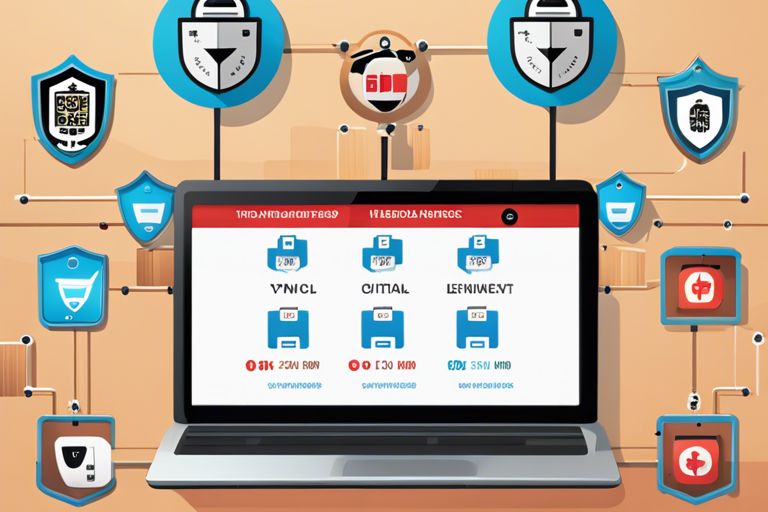
Maintaining Your VPN on Android Devices
All VPN users should prioritize maintenance to ensure continued security and optimal performance on their Android devices. Proper upkeep includes regular updates, performance monitoring, and keeping your subscription current, which collectively safeguard your online activities and access to global content.
Regular Updates and Maintenance
The importance of keeping your VPN app updated cannot be overstated. Updates often include imperative security patches, improved features, and bug fixes that enhance performance. By enabling automatic updates through the Play Store, you ensure that you always use the latest version, maximizing the security of your data and ensuring compatibility with Android’s evolving operating systems.
Monitoring Your VPN Performance
Your VPN’s performance directly impacts your browsing and streaming experience. Regularly check for any sudden drops in speed or connection stability, as these can signal underlying issues. You can use built-in speed test tools or third-party options to verify that your VPN is providing the fast speeds promised, ensuring uninterrupted streaming and browsing.
Plus, you should be aware of factors that can affect your VPN’s performance, such as server load, distance to the server, and network conditions. Staying vigilant about performance will allow you to switch to less congested servers when necessary, maintaining fast and reliable internet access while using your VPN.
Renewing Your VPN Subscription
Regularly evaluate your VPN subscription to prevent service interruptions. Most VPNs offer various subscription plans, and failing to renew can lead to loss of access to secure browsing, streaming services, and additional features that protect your privacy.
It’s imperative to keep track of your subscription expiry date and take advantage of renewal discounts often provided by VPN services. By doing so, you not only save money but also ensure that your online safety and access to sacred sites like Netflix or Amazon Prime remain intact. Always choose a reliable provider with a transparent cancellation policy to avoid any unwanted issues.
Final Words
Drawing together the various methods to set up a VPN on your Android devices in 2024, you can enhance your online security and accessibility to global content with ease. Whether you choose to download a dedicated app like ExpressVPN, use an APK, or configure VPN settings manually, each method offers unique advantages. By following the outlined steps, you can protect your personal information and enjoy seamless streaming, all while navigating the internet anonymously. Take control of your online presence and ensure your privacy today.

